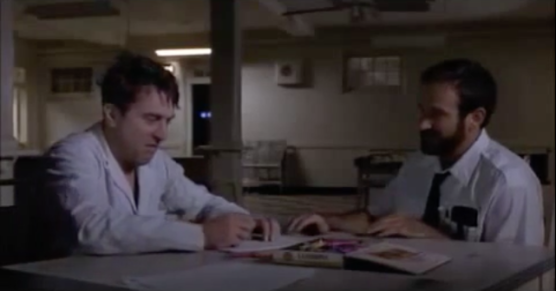Robert De Niro and Robin Williams (and Randy Newman) cause me to cry. A lot.
Awakenings
Dir: Penny Marshall
Original Release Date: 22 December 1990
Follow ILT on twitter @laidbaremedia
Like ILT on facebook
No film has ever prised raw human emotion from the grips of my cynical soul quite like Awakenings. Penny Marshall’s 1990 biopic/drama – based on Dr. Oliver Sacks’ 1973 memoir of the same name, and unknown to me until recently – covers the true story of Sacks’ experience at a hospital in The Bronx, New York, in 1969. During that time he successfully “awakened” patients suffering from encephalitis lethargica, which had left them in a completely catatonic state since the 1920s. Starring Robin Williams as Dr. Malcolm Sayer (based on Sacks) and Robert De Niro (who was nominated for an Academy Award) as his patient, Leonard Lowe, it is as moving as a motion picture could possibly be.
Put simply, I cried. A lot. I let it all out. More than I ever have done during any one of the thousands of films that preceded it. The red wine would be the logical macho excuse (although the red wine itself practically counters the excuse before it begins), and it no doubt played a part, but to be honest, just re-watching the scene in question that triggered it all, Leonard’s original “awakening”, is triggering some mist about the room. Within the full context of the film, as you can imagine, I was positively Niagara Falls…
While the film inevitably spirals toward enough tragedy for the term “sad” to the be the understatement of the century, it was actually this quite frankly beautiful moment of release and realisation, of freedom and simple self-awareness – factors we all take for granted – that drew the first tear. Soon, I was bawling, my mind working simultaneously with that of the characters, feeling the mental and emotional intensity conveyed, and the relief within the moment of release that it built up to.
From a dramatic perspective, it’s perfect filmmaking. Marshall could just as easily have made Williams’ Sacks-based physician the primary focus of the picture, but instead she opted to tell the story of the event itself, shown jointly through the eyes of doctor and patient. Dr. Sayer guides us firstly, establishing context. Then, at this moment of overwhelming success, he and Leonard share in the moment they’ve both long been fighting for, albeit it in manners of vast difference. Aided by Randy Newman’s oh-so-Randy-Newman score (the man can play your heartstrings like a harp given the right sort of production), Marshall wisely keeps the framing and tone of the revelation and consequential interaction as low key as possible, allowing the performances to really drive the scene. And my word do they.
De Niro’s childlike enthusiasm as a method of conveying Leonard’s rebirth is somehow so relatable deep down that you have no trouble believing it. The glance to the left and cheeky smile that precede his whispered, “I’m not asleep…”, are each magnificent in execution; subtle, yet so incredibly powerful. If any doubt remains that this man is the greatest screen actor of all time, then it would certainly make for some interesting reading. Even Brando didn’t do method quite like this, and certainly not as consistently.
Williams, demonstrating to many for the first time his qualities in an outright serious role, responds in kind, desperately trying to keep his composure upon delivery of, “No, you’re awake”; lips trembling as he fights the temptation to well up. Of course this only makes us vulnerable souls well up even more, but that’s the idea. As Sayer gently asks for, and accepts what Leonard has been writing – a poignant call back to the latter’s traits and troubles at the beginning of the film – Williams produces a lovely double take and almost restrained laugh, as if he’s stopping himself from getting lost in the moment and leaping for joy. After De Niro confirms Leonard’s recognition of who he is, the word “Leonard” is revealed to the audience – another pull on the tear trigger. Williams finally displays the bottled up happiness that his character has been wanting to release, but has held back for fear of it never being fully justified…and the two of them smile. Cue audience breakdown.
Plenty of other sequences in the film inspire literal outpourings of optimism, relief, sympathy, and despair, whether it be the very next scene, in which Leonard is consciously reunited with his mother, his taped declaration of, “I’m back…”, his dance with Paula, or his gradual, heartbreaking descent back into the deep, dark realms of living death. It’s the respective expressive emotional states present throughout the scene of original “awakening” however, channelled by both actors and subsequently their characters during the first genuine interaction between them, that overall comes as close to conveying a duel modern screen acting masterpiece as you’re ever likely to ever see.

Follow ILT on twitter @laidbaremedia
Like ILT on facebook

